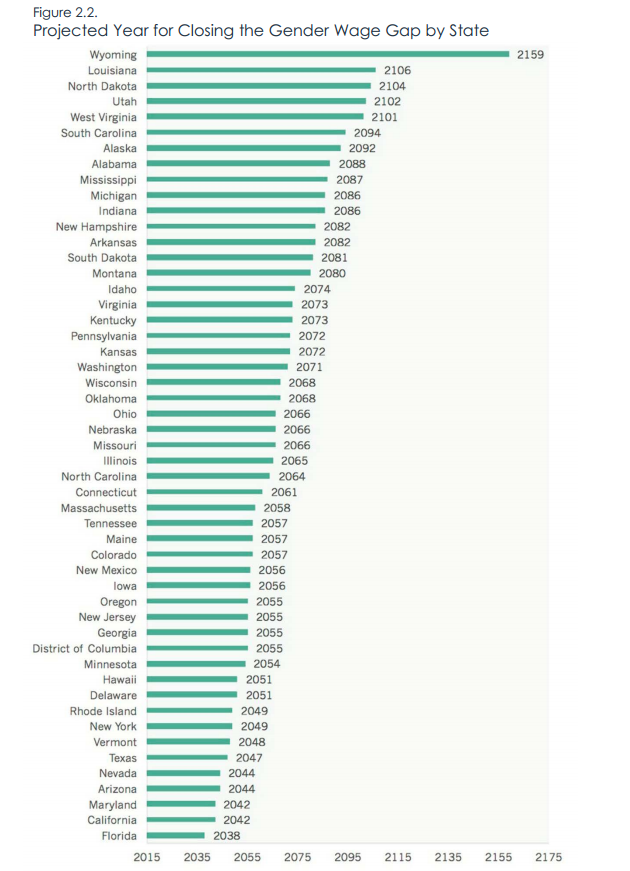Women Won't See Equal Pay For Another 43 Years

By:
Though the gender wage gap has gotten smaller over the past few decades, women have several more decades to go before finally earning as much as men. Using Census data, the Institute for Women's Policy Research (IWPR) published a report that found it will take another 43 years for the wage disparity between genders to go away.
The IWPR came to this conclusion after studying the growth in gender wage equality since the 1960s. The gap is notably smaller now, with women taking home around 78 cents for every dollar a man earns. In 1980, women earned 60 cents for every dollar earned by men. While these numbers reflect a positive change for women, the progress is slow enough that Millennial women might retire before full pay equality takes place, and that's only if they live in progressive states.
Some areas will see the gap eliminated before 2058, when females all over the U.S. will supposedly have equal pay. Florida is set to be the pioneer state for gender pay equality, projected to reach it in 2038. California is four years behind at 2042, and the women of Wyoming will have to wait until 2159, another 144 years, to see gender wage equality. So, while the female grandchildren of current Millennials will have a shot at equality in places like California and Florida, Wyoming won't have the same kind of results for several generations.

"Despite progress in many parts of the country, women’s status on employment and earnings either worsened or stalled in nearly half of the states in the last decade,” IWPR President Heidi Hartmann said in a statement. “When half the country is not seeing any gains in women’s employment and earnings, it is a concerning prospect for the nation’s economy as a whole.”
What are the variables?
The 2058 pay gap end date is definitely alarming, but it's important to understand the variables at play and why certain areas will progress faster than others. The pay gap parity is dependent on state, education level, race, and choice of industry, as the Daily Beast points out. Hispanic women earn just a little more than 50 percent as much as the average white man, yet Asian women earn nearly 90 cents to a man's dollar.
The pay gap widens as women obtain more education, although education may increase a woman's earnings overall. Women with associate's degrees have it the best by earning 80 percent as much as their male counterparts. Women with graduate degrees earn less than 70 percent of what men in comparable roles take home, and females with a bachelor's degree have it only slightly better at 71.4 percent. Because so many women take out students loans to pursue bachelor and graduate degrees, the disparity means they might take longer to pay off their debt than a man would.
Study analyst Jessica Milli told the Daily Beast that women are also underrepresented in STEM [science, technology, engineering, and math] positions, which are very well compensated. But even highly paid industries can still give women the short end of the stick. The average median STEM salary for men was $78,000 while it was only $64,000 for women in 2013, according to IWPR. Additionally, as ATTN: reported earlier this month, it's not just male-dominated fields; women in female-dominated public relations earn less than men in the field.
While many find the gender pay gap troubling, some say it's a lot more complicated than women getting smaller paychecks for no reason. As Christina Hoff Sommers wrote in the Daily Beast last year, the pay gap doesn't take into account differences in hours logged per week, professions, education, and specific roles. Bloomberg Businessweek found women with families are hit hard by the pay gap, often because they may be clocking in fewer hours at the office or choosing to work part-time. Even so, many say this puts women at a disadvantage as they're more often forced to choose between family or careers.
Milli added that the good news is more females are investing in higher education.
"Women are earning the majority of college degrees in the U.S. This might have some positive implications because these women may then start earning more."
Hoff Sommers made similar comments in her piece:n"Have [anti-wage gap groups] noticed that American women are now among the most educated, autonomous, opportunity-rich women in history?"
While it's true that women outnumber men in college, student debt remains a huge problem for everyone, so as long as women earn less, they'll face greater setbacks all around.
